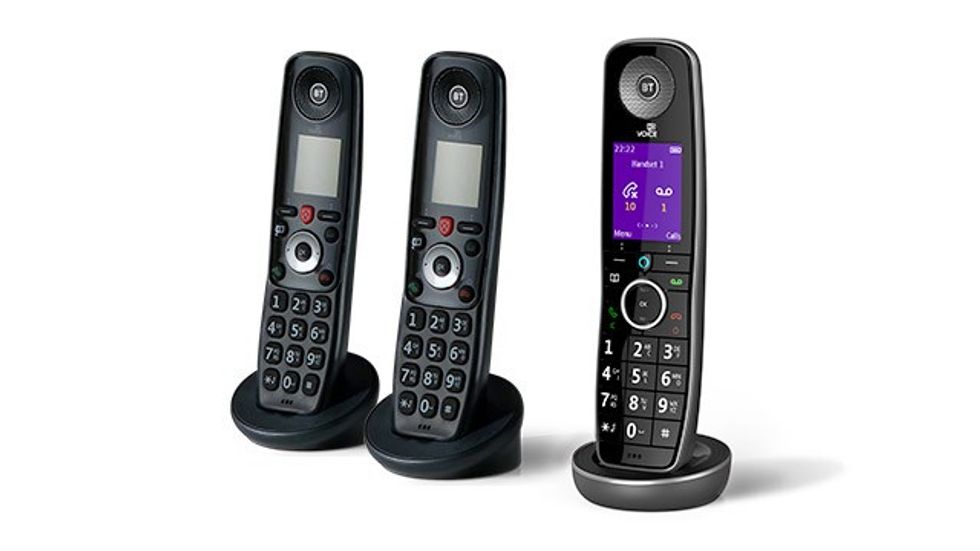Major agreement reached with BT and rival brands to protect millions of users during UK landline switch-off
Openreach and CityFibre, the UK's biggest broadband suppliers, have announced a new agreement to ensure that vulnerable people are protected in the transition from analogue landlines to broadband-powered phone lines
New agreement reached with UK's biggest telecoms providers to shield 2 million vulnerable people
- BT-owned Openreach and CityFibre confirm new agreement to protect users
- Another 5 smaller network operators have also signed-up to Government terms
- Vulnerable customers with personal alarms will never be cut-off again
- It follows suspension of all upgrades last year following “serious incidents”
- Alarms used by 2 million people were found to suffer from compatibility issues
- Unlike copper landlines, broadband-based phones do not work during outages
- Michelle Donelan said the new agreement offers "much-needed reassurance"
- Copper-based analogue landlines will be switched off nationwide in 2025
Don't Miss
Most Read
Trending on GB News
The UK's biggest broadband suppliers — including BT, EE, Plusnet, and Vodafone, to name just a few — have agreed to protect millions of vulnerable people who rely on personal alarms in the ongoing nationwide upgrade from traditional copper landlines to internet-powered digital alternatives.
The agreement follows a swathe of complaints from vulnerable customers who experienced issues with the switch from their existing landline to the broadband-powered alternative. For months, there were reports of BT customers losing the landline number they’d held for 50 years, others struggling with incompatibility with their safety equipment, and the unluckiest users stranded without a landline connection for days.
BT and Virgin Media slammed the brakes on its upgrade scheme nationwide in the wake of these complaints.
In total, seven major network operators, including BT-owned Openreach, Community Fibre, and CityFibre, have now committed to ensuring that those who rely on telecare alarm systems – emergency buttons which automatically call the emergency services when pressed via a user’s landline – will never be left without a functional device during the migration process.
Almost two million people use the alarms in the UK.
Across the UK, the telecoms industry is in the process of upgrading landlines to a digital alternative that relies on an internet connection, known as Voice over Internet Protocol (VoIP) or All-IP telephony. The upgrade has to be completed before the nationwide switch-off of analogue landlines planned for 2025.
Household brands like TalkTalk, Plusnet, Vodafone, and Sky Broadband rely on the infrastructure owned and operated by Openreach and CityFibre.

BT has already turned off analogue landlines for 2 million customers nationwide, transitioning them over to its broadband-powered "Digital Voice" system
BT PRESS OFFICEBT, the single biggest provider in the UK, has branded its broadband-powered landline as "Digital Voice".
When switching to the system, BT promises clearer calls and better protection from fraud and spam calls. If you already have a full-fibre broadband plan with BT, nothing will change as the company has offered Digital Voice to fibre customers as standard for many years.
BT stopped selling copper-based products to all new customers back in September. If you're unsure whether you're already using the newer system, the easiest way to check whether you're already using the new system is to look for "Digital Voice" branding on the handset or check whether it's plugged into the back of your Wi-Fi router or a landline socket.
We have reached a new agreement with telecoms operators to ensure that vulnerable people in the UK are better protected during the transition to digital landlines.
— Michelle Donelan MP (@michelledonelan) March 11, 2024
A new charter signed today ensures that no one is left without access to help when they need it most. https://t.co/HqEfQxCTKD
While many of the most popular personal alarm systems do work with digital landlines, a power cut or internet drop-out can cause them to fail, while copper phone lines typically continue to work even during power cuts.
Addressing the new agreement between rival telecoms brands, Technology Secretary Michelle Donelan said: “The safety of vulnerable customers comes before anything else and that’s why I called on the industry to listen to concerns and take action to make sure the right protections are in place.
“I welcome more telecoms companies joining forces to make this a priority, meaning we now have agreement from those responsible for our telecoms infrastructure and those providing mobile and broadband services.
“This will provide much-needed reassurance to those relying on these vital devices and I will continue to pressure organisations to do everything in their power to make sure the switchover is seamless and safe.”
LATEST DEVELOPMENTS
Digital Infrastructure Minister Julia Lopez said: “The recent incidents that left some people disconnected are unacceptable and must not happen again. I hope today’s agreement provides some peace of mind to those affected and reassures the millions of vulnerable people in our country that their concerns have been heard far and wide across the whole industry.”

Three Digital Voice handsets from BT, the proprietary system created by the brand to offer VoIP calls to customers after copper landlines are retired in 2025
BT PRESS OFFICE
Consumer watchdog Which? Director of Policy and Advocacy, Rocio Concha said: “We’ve heard of vulnerable people being left unable to contact emergency services due to issues with digital migration, so it is positive that the Government is getting assurances from operators as well as providers that they will protect customers during the switchover.
“The Government and Ofcom must be prepared to take tough action if firms fail to keep up their side of the bargain. The transition to digital landlines is necessary and offers advantages, but it is vital that no-one is left behind as the migration continues.”
The complete list of network operators who have agreed to the Government's new charter are...
- OpenReach
- CityFibre
- AllPointsFibre
- CommunityFibre
- Ogi
- KCOM
- WightFibre
Why are analogue landlines being changed across the UK?
Telecom providers, like BT, are switching customers away from traditional analogue landlines to a new digital alternative. Since 1911, copper wire has been the backbone of connectivity across the UK – but its time is finally over.
Openreach, which manages the broadband and phone infrastructure across the UK, will switch off the copper cable network in 2025. The switch was kickstarted because copper landlines were deemed no longer fit for purpose.
That's because broadband-powered VoIP offers clearer quality calls, but it's a change driven by the general shift across the industry. The majority of phone manufacturers and suppliers now produce digital-only equipment, which will not work with traditional copper landlines. Without these upgrades, customers could order a home phone online and find it incompatible with their BT landline.
BT customers over the age of 70 are not proactively switched to Digital Voice, the company has reassured. But since July 2023, BT has started to trial switching customers aged between 70-74 who live in urban areas and have the latest broadband hub and don't regularly make landline calls. According to BT, these trials have gone well to date, with 98% of customers choosing to make the switch.
Key Facts About The Switch From Old Landlines
- It's not just BT, with all UK landline providers moving away from analogue landlines
- The new technology relies on an entirely digital VoIP (Voice Over Internet Protocol) system
- VoIP is used to power WhatsApp, FaceTime, and Facebook Messenger audio calls
- Only BT uses the branding 'Digital Voice', with others launching their own equivalents
- Your landline number will not be changed during the switchover
- BT plans to complete its switch nationwide by mid-2024
- The traditional copper landline network will stop working in 2025
- Existing broadband customers won't be charged extra after the switch
- Traditional landlines continue to work during a power cut as they draw power from the exchange
- But VoIP systems will not work during outages without a backup power bank
What Happens During A Power Cut?
This is one area where the new VoIP landline system stumbles compared to its copper-powered predecessor. Traditional landlines can continue to work even if there's a power outage as the telephone line draws its power from the nearest exchange, which has a backup to keep people connected.
If you've ever tried to stream a show, send a message on WhatsApp, or search on Google during a power outage - you'll be aware that the same is not true of broadband infrastructure.
BT is offering to send a battery pack to some of its most vulnerable customers, which will enable them to continue to make and receive calls during a power cut. If you have previously disclosed additional needs to BT, then make sure that you are sent a battery during the switchover process.
If you're not eligible for a complimentary battery pack from BT, then these are available to purchase from a host of high street and online retailers.








